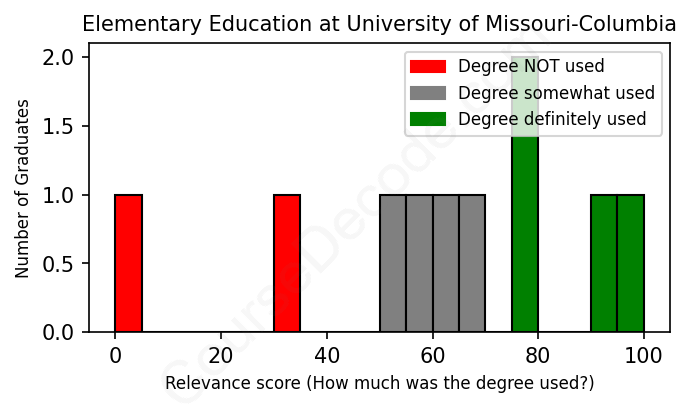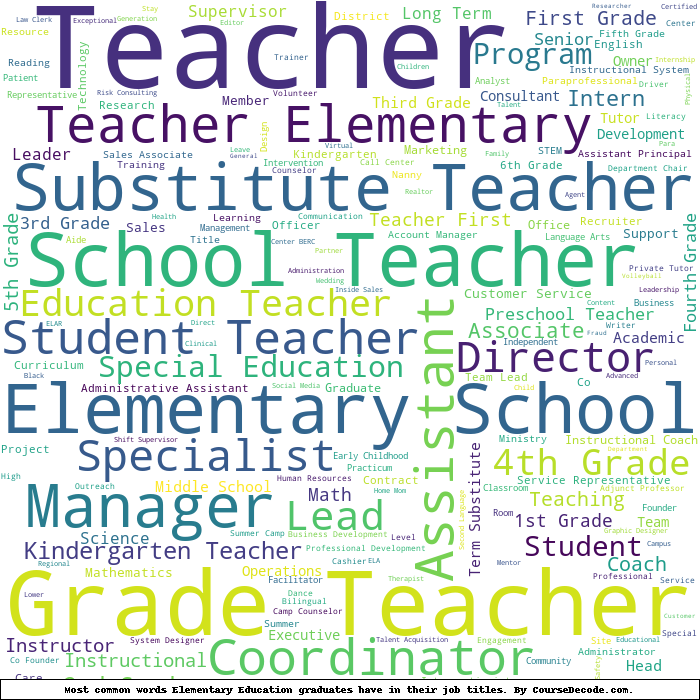
First, some facts. Of the Elementary Education graduates from University of Missouri-Columbia we've analyzed , here's how many have used (or NOT used) their degree in their career:

These are estimates based on AI analysis of 10 LinkedIn profiles (see below).
The verdict? Slightly below average. Overall, with an average relevance score of 62%, Elementary Education graduates from University of Missouri-Columbia have a slightly lower likelihood (-5%) of finding work in this field compared to the average graduate across all fields:
And for comparison, here's the chart for all profiles we've looked at across all degrees.
Also, after graduating, only 30% of these graduates have pursued further education other than another Bachelor's degree (such as a Masters degree or other), compared to the average across all profiles of 35%. This suggests a Bachelors degree is enough for most Elementary Education graduates, and it's normal to look for work straight after graduation.
See the details:
|
Relevance score: 33% We think this person has NOT gone into a career related to their degree. We think this person has NOT gone into a career related to their degree.
DEGREE INFOGraduated in 2017 from University of Missouri-Columbia with a Bachelor's degree in Elementary Education. Also pursued further education since (see below). JOB HISTORY SINCE GRADUATIONThird Grade Teacher Derby Ridge Elementary School May 2017 - May 2019 Third Grade Teacher  Columbia Public Schools Apr 2019 - Aug 2020 Nanny  THE NANNY JOYNT, L.L.C. Aug 2020 - Jun 2021 Clinical Supervisor  Western Governors University Jan 2021 - Jun 2021 Sales Associate  Club Pilates Mar 2021 - Mar 2023 Transaction Coordinator  Lake Pleasant Real Estate Jun 2021 - Mar 2023 Licensed Real Estate Agent  Lake Pleasant Real Estate Nov 2021 - Mar 2023 Director of Operations  The Brokery Feb 2023 - Present FURTHER DEGREES DONE SINCE GRADUATINGMaster of Education - MEdUniversity of Missouri-Columbia 2016 - 2018 ABOUTCurrently serving as Transaction Coordinator, Operations Manager, and Realtor at The Brokery in Phoenix, AZGraduated from University of Missouri in May 2017. Taught third grade in the Columbia Public School district from 2017-2020. Received my Masters Degree in Learning, Teaching, and Curriculum at the University of Missouri in 2019. After my time in education, I switched gears and began working in Real Estate in June of 2021. Enjoys travel, being a foodie, playing outside with my goldendoodle (Stella) and spending time with friends and family. |
The top 10 most common jobs done by the graduates we've analyzed (ranked most common to least) are:
Looking through the job titles from alumni of the University of Missouri-Columbia who studied Elementary Education, it's pretty clear that there’s a strong emphasis on teaching positions, especially in public schools. Many graduates landed roles as teachers in various grade levels, which makes total sense considering their degree focus. These teaching jobs actively utilize the educational theories and pedagogical skills learned during their college years. Positions like Fourth Grade Teacher, Second Grade Teacher, and even Substitute Teacher directly align with the training they received and highlight their relevance to the degree. For instance, being a teacher at Parkway Schools or Acero Schools involves daily applications of what they learned about child development and lesson planning.
However, not all jobs were directly related to elementary education, which raises some interesting points. Some graduates found themselves in roles like Business Development Manager or Marketing Director—positions that don’t really tap into their teaching skills at all. In these cases, it feels like they either ventured into unrelated fields or transitioned into jobs that make use of broad skills, like communication and organizational abilities. There are also some jobs like Talent Acquisition Specialist that somewhat touch on education but primarily lean towards HR tasks rather than teaching. So, while a good number of alumni went into relevant teaching roles, a surprising chunk seemed to veer off into other industries, showing a mixed bag in terms of how closely their jobs relate to elementary education.
Here is a visual representation of the most common words in job titles for Elementary Education graduates (this is across all Elementary Education graduates we've analyzed, not just those who went to University of Missouri-Columbia):

When looking at graduates from the University of Missouri-Columbia with degrees in Elementary Education, it’s clear that many of them have launched careers that are closely tied to teaching and education. For new graduates, the most common first job tends to be as an elementary school teacher in various districts, where they often stay for several years. For instance, many graduates from the Class of 2012 and 2015 have remained in teaching roles, sometimes for nearly a decade. A significant number demonstrate a commitment to the field, taking on roles that extend beyond the classroom, such as administrative positions or educational development roles within educational bodies.
However, there’s also a noticeable trend among some graduates to diverge from direct education roles as time goes on. For instance, graduates from 2017 and 2020 showcase a mix of educational roles and a shift into business or marketing positions after several years in the classroom. This suggests that while many graduates start off strong in elementary education, some eventually transition into different fields altogether, perhaps driven by personal interests or market opportunities. Overall, the career trajectories reveal a solid foundation in teaching with various pathways leading some away from education, highlighting the versatility of an elementary education degree.
Honestly, pursuing a Bachelor’s degree in Elementary Education at the University of Missouri-Columbia—or really anywhere—can be a mixed bag. It’s not the easiest path, but it’s not the hardest either. You’ll have to juggle your coursework, which includes learning about child development, teaching strategies, and educational psychology, alongside practical experiences like student teaching. While some people find the hands-on stuff engaging and rewarding, others might find the rigorous academic side challenging, like writing lesson plans or doing research projects. Overall, it's a pretty manageable degree if you're passionate about teaching and willing to put in the effort, but it definitely comes with its own set of challenges.
Most commonly, in the LinkedIn profiles we've looked at, it takes people 4 years to finish a Bachelor degree in Elementary Education.
Looking at these graduates from the University of Missouri-Columbia, it’s kind of a mixed bag when it comes to their earnings. The first grad who jumped into marketing roles seems to have scored some decent pay considering the progression into director-level positions—definitely a step up financially. On the other hand, most of the others, especially the teachers, likely started with pretty standard teaching salaries, which aren't typically high, especially in the early years of their careers. Some did switch things up later, like moving into business roles or marketing, which could potentially boost their income. Overall, it looks like some have found ways to climb the pay ladder, while others are still grinding it out as teachers, which doesn’t always offer the best financial rewards. So, it really depends on the path they chose post-graduation!
Here is a visual representation of the most common words seen in the "about" section of LinkedIn profiles who have a Bachelor degree in Elementary Education (this is across all Elementary Education graduates we've analyzed, not just those who went to University of Missouri-Columbia). This may or may not be useful:

Here are all colleges offering a Bachelor degree in Elementary Education (ordered by the average relevance score of their Elementary Education graduates, best to worst) where we have analyzed at least 10 of their graduates: